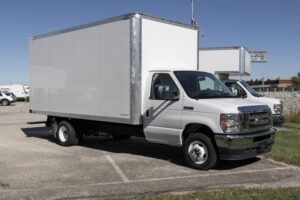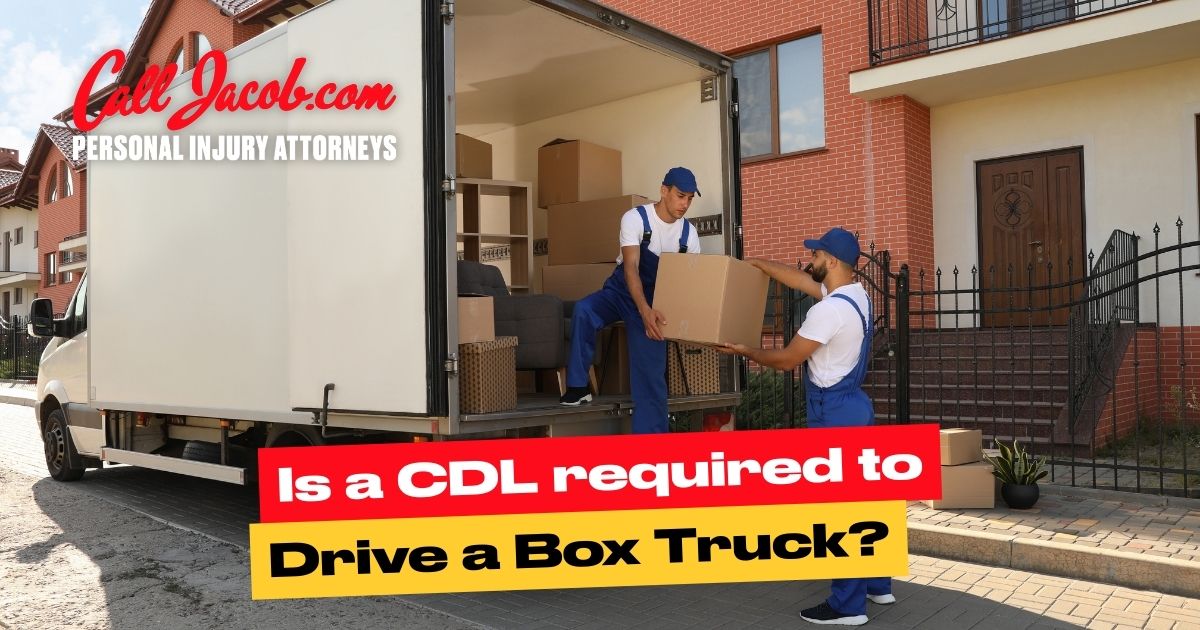Whether moving goods for a business or helping a friend relocate, you’ve likely encountered or driven a box truck. But when it comes to legality, many people ask: Do you need a Commercial Driver’s License (CDL) to drive a box truck? The answer isn’t always straightforward, as it depends on several factors, including weight, size, and the truck’s intended use. In this guide by personal injury attorney Jacob Emrani, we’ll clarify when a CDL is required, what types of CDLs apply, and why obtaining one might benefit you even if it’s not strictly necessary.

What Is a Box Truck?
A box truck, sometimes called a cube truck, cube van, or straight truck, is a medium-sized vehicle characterized by its rectangular cargo area separated from the cab. Unlike semi-trailers, box trucks have the cargo compartment permanently attached to the chassis. They are commonly used for deliveries, moving services, and transporting equipment for tradespeople or contractors.
You’ll see box trucks being used by companies like U-Haul, FedEx, and furniture movers. Their size makes them ideal for urban and suburban deliveries because they’re more maneuverable than larger tractor-trailers but can still haul significant loads.
Different Sizes and Weight Classes
Box trucks come in various sizes and weight capacities, typically classified by the Gross Vehicle Weight Rating (GVWR), which is the maximum operating weight of the vehicle, including cargo, fuel, and passengers. Common box truck sizes include:
- Light-duty box trucks: 10 to 14 feet long, with a GVWR under 10,000 lbs.
- Medium-duty box trucks: 15 to 26 feet long, with a GVWR between 10,000 and 26,000 lbs.
- Heavy-duty box trucks: Over 26 feet long, with a GVWR exceeding 26,000 lbs.
Do box trucks require a CDL? Understanding the GVWR is crucial because it often determines whether a CDL is required to operate the vehicle.
What Is a Commercial Driver’s License (CDL)?
A CDL is a specialized license required in the United States for operating large, heavy, or hazardous material-carrying vehicles for commercial purposes. It ensures that drivers possess the necessary skills and knowledge to safely maneuver bigger vehicles that pose more risk on the road.
There are three main CDL classifications:
- Class A: Required for operating vehicles with a combined GVWR of 26,001 lbs or more, including towed trailers weighing more than 10,000 lbs.
- Class B: Needed for single vehicles with a GVWR of 26,001 lbs or more or vehicles towing a trailer weighing less than 10,000 lbs.
- Class C: For vehicles that transport 16 or more passengers or hazardous materials.
When Is a CDL Required to Drive a Box Truck?
The key factor in answering “what kind of license do I need to drive a box truck?” is GVWR:
- No CDL Required: A box truck with a GVWR of 26,000 lbs or less can legally be driven with a standard, non-commercial driver’s license.
- CDL Required: If the GVWR exceeds 26,000 lbs, a Class B CDL is typically required.
Additionally, even if the GVWR is under 26,000 lbs, you may still need a Class C CDL if:
- You’re transporting hazardous materials requiring placards.
- You’re driving a vehicle designed to carry 16 or more passengers.

What Type of CDL Is Needed for Larger Box Trucks?
For box trucks that exceed the 26,000 lbs GVWR threshold:
- A Class B CDL is generally sufficient because these are single vehicles not towing trailers over 10,000 lbs.
- If the box truck tows a trailer over 10,000 lbs (rare for box trucks but possible in specialized cases), a Class A CDL might be necessary.
Steps to Determine If You Need a CDL
- Step one: Check the GVWR, usually found on a sticker inside the driver’s side doorframe or in the vehicle manual.
- Step two: Determine cargo type, such as hauling hazardous materials or a large number of passengers.
- Step three: Consult state regulations: CDL requirements can vary slightly from state to state. Always verify with your state’s Department of Motor Vehicles (DMV).
- Step four: Assess the trailer. If your box truck is towing a trailer, you’ll need to calculate the combined weight of the truck and trailer to see if a Class A CDL is necessary.
- Step five: Check employer requirements: Some employers require a CDL for box truck drivers regardless of weight, for insurance or liability reasons.
What If a CDL Is Not Required?
If your box truck has a GVWR under 26,001 lbs and doesn’t fall under hazardous material or passenger transport rules, you only need a regular driver’s license. However, that doesn’t automatically mean you’ll be comfortable or skilled enough to handle a box truck safely.
Even without a CDL requirement:
- Experience helps: Box trucks can be challenging to maneuver in tight urban spaces.
- Training is beneficial: Defensive driving courses or professional training on larger vehicles can improve safety.
- Insurance should be considered: Some insurance providers might offer better rates if you have advanced driving credentials.
Benefits of Obtaining a CDL Even If It’s Not Required
While a CDL may not be legally necessary for smaller box trucks, there are clear advantages to getting one:
- Employment opportunities: Many logistics companies prefer or require drivers to have a CDL, broadening your job prospects.
- Higher earning potential: CDL holders often qualify for better-paying positions and specialized roles in freight and delivery services.
- Improved safety and skills: The CDL training process teaches valuable techniques for handling large vehicles, navigating tricky situations, and understanding transportation laws.
- Insurance savings: CDL-certified drivers can sometimes secure lower insurance premiums, thanks to their demonstrated expertise.
- Professional credibility: Holding a CDL can enhance your reputation in the driving and logistics industry, showcasing your commitment to professionalism and safety.
Contact The Law Offices of Jacob Emrani Today
If you’ve been involved in a box truck accident or have legal questions regarding commercial vehicle operation, the complexities can be overwhelming. Whether it’s a matter of CDL compliance, accident liability, or employer requirements, you need seasoned legal expertise on your side.
Contact us today for a free consultation and ensure your rights are protected — whether you’re behind the wheel of a box truck or sharing the road with one.




